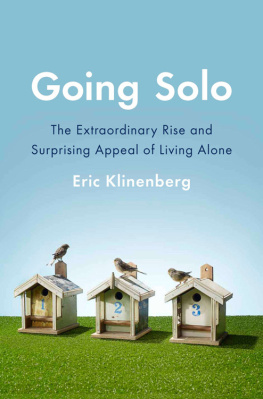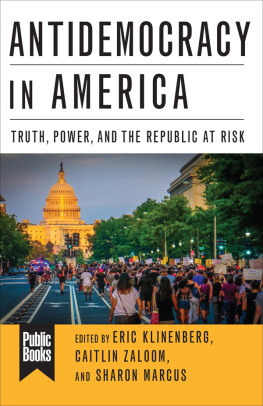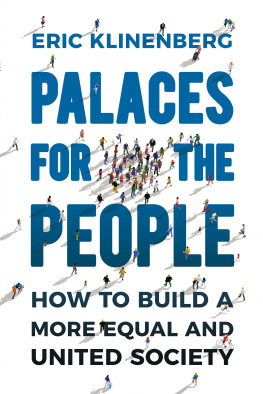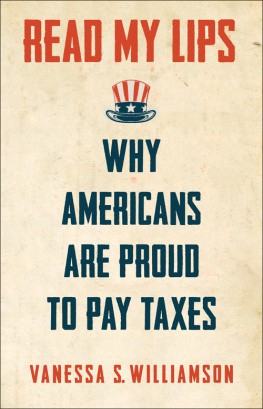A LSO BY E RIC K LINENBERG
Fighting for Air
Heat Wave
PROTECTING THE SELF
N O ONE REALLY BOWLS ALONE.
The provocative phrase, from Robert Putnams sweeping account of the decline of civic participation in the United States, is a metaphor, not a finding (as he acknowledged). Putnam used it with great effect to dramatize the fact that participation in bowling leagues had fallen during the second half of the twentieth century, as had participation in a number of historically significant civic associations and membership groups, from the Boy Scouts to the Elks clubs and the League of Women Voters. The truth is, Americans continue bowling together, but with friends (and friends of friends) in their social network, not in formal teams or organized groups.
The distinction is important. When Bowling Alone was published in 2000, pundits and policy makers worried that families were watching TV together in their living rooms rather than interacting with each other in the public sphere. Today, our most pressing social concerns are differentand not just because were nostalgic about the days when family members watched TV together rather than on their own miniscreens! In the first years of the twenty-first century weve witnessed the rise of new forms of interpersonal engagement and civic participation, from MoveOn to MySpace, e-government programs to microlending initiatives such as Kiva. We are, as headlines tell us: Addicted to Social Media, Trapped in a World Wide Web, Caught in the Net. Our most burning questions about the nature of contemporary society are not about isolation, but the problem of being hyperconnected, or of living with what the technology guru Linda Stone calls continuous partial attention, because we are so deeply embedded in the personal, professional, and social activities we perform online.
All of this should affect the way we understand how and why we live alone today. Whether or not we go solo, most of us are immersed in one or more social worlds, and today a growing number of critics have begun to worry that we are in too deep. We are experiencing the end of solitude, writes the essayist William Deresiewicz, who claims that in contemporary culture we live exclusively in relation to others and that too many of us find it impossible to be alone. The sociologist Dalton Conley goes further, arguing that we are witnessing the death of the individual and the birth of intraviduals: busy professionals whose lives are dedicated to managing the myriad data streams, impulses, desires, and even consciousness that we experience in our heads as we navigate multiple worlds.
Arguments like these are intriguing but not quite persuasive. Granted, theres good reason to worry about the cognitive development of young people who spend their days steeping in text messages, TV, and the Internet; about the rise of knowledge-based service-sector jobs that require professionals to spend their days and nights e-mailing and doing relationship management with clients or colleagues; about the psychological well-being of crack-berry junkies who cannot focus on the world beyond their smart phone. But does this really signal the end of solitude or individualism? After all, the network society emerged only after massive numbers of young adults began living alone for the first time in history and unprecedented numbers of children started growing up in rooms of their own. Its hard not to see a relationship between the demand for constant connection, whether online or on the job, and the enormous increase in the amount of time we spend on our own. And its important to note that not everyoneindeed, most of usarent always elsewhere, seeking out contact or a new Facebook friend.
In fact, we interviewed a number of people who said living alone was a way to buffer themselves against the intense pressures of social and, especially, vocational life. To be sure, this strategy for protecting the self means something different for affluent and middle-class people than it does for the poor, the mentally ill, or the physically frail. For successful professionals, living alone as a form of self-protection typically means establishing ones home as a sanctuary in the city, one that facilitates the very pursuit of solitude and self-discovery that Deresiewicz and Conley fear weve abandoned. It doesnt always work this way, however. Some of the affluent and middle-class people we interviewed acknowledged that theyd sought out a place of their own to avoid toxic relationships, or to escape from a community that took more than it gave. The disadvantaged men we interviewed were even more likely to report motivations like this. For them, living alone can easily lead to a dangerous extreme, resulting not only in domestic autonomy but also in reclusiveness, hoarding, and other antisocial behaviors that turn ones safe house into a tomb. Even more judicious forms of social withdrawal may lead to a kind of miserable security, as in the case of many of the ex-convicts, substance abusers, and unemployed men who take refuge in single-room occupancy hotels (SROs) and cheap efficiency apartments to avoid friends and family whose company brings more trouble than its worth.
Living alone is a way to protect the self, yet it also risks imperiling it, and its no surprise that people in good physical, emotional, and financial health are better able to find the right balance than those who are sick or poor. For those with financial security, a busy schedule, and a dense social network, living alone can be productive because it offers access to privacy, restoration, and personal development. But for the vulnerable it more often leads to what Berkeley sociologist Sandra Smith calls defensive individualism, a dangerous state that fosters distrust toward other people and institutions, and ultimately toward the self as well.
MOST PEOPLE WHO LIVE ALONE are financially secure, not poor, and those who purposely use their domestic space as an oasis from their busy, stressful work lives report that it is a regenerative, not an isolating experience. Phil is a successful journalist in his late forties, and he says that working and living in Manhattan requires giving so much of himself that at the end of the day he needs to shut things out. I wouldnt say Im a solitary person, he explains. But I like privacy. I need time to recharge.
Unmistakably outgoing, with a warm smile and a kind demeanor, Phil has spent most of the past two decades living independently, and hes learned how to organize his home so that it accommodates the particular kind of solitude he seeks. I like having control of my own space, making it like my childhood room at large, but calm, like how it feels in church. I not only live alone. Ive mostly lived without a television, without a pet. Phil sees domestic tranquillity as a means of deepening his self-knowledge and, in turn, enhancing his creativity. He believes that the time he spends alone helps him to be a better writer, a better thinker, and a more engaging person. Like the late psychologist Anthony Storr, Phil argues that solitude can bring us closer to ourselves, and he can rattle off a long list of great artists and authors who spent most of their lives in a place of their own.
Although his life has never been busier, living alone gives Phil ample time to confront his feelings, and he says that now, instead of getting bogged down by questions about how he got here, he uses his hours at home to think about where hes heading and whether hes living the way he wants. As he approaches fifty, he realizes that if he stays single there will be new challenges ahead. The frailty of aging and the growing awareness of ones own fatality start to factor in. You think, you know, whats gonna happen? Whats scary, Phil says, is the prospect of dying without loved ones nearby. The big thing that changes with age in terms of living alone is that the words dying and alone start to become associated with each other, he explains. Nobody worries about dying married.
Next page







